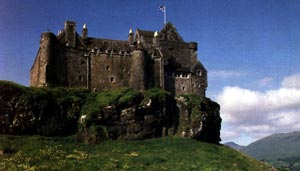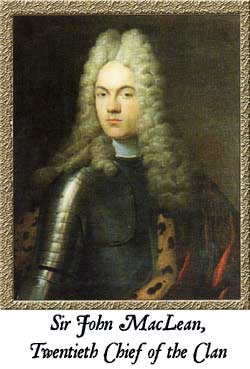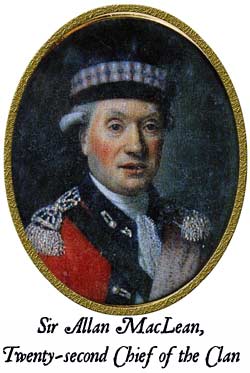 The
power and influence of the Clan Maclean was at its zenith
at the time of Sir Lachlan's death. However, the Campbells
were powerful in the Stuart Court and were quick to seize
opportunities of humbling the Macleans and Macdonalds, who
were weakened by the years of inter-clan warfare and by the
deaths of their chiefs. James VI discovered, and violently
disapproved of, Sir Lachlan's dealings with Elizabeth I, and
this led to the sequestration of Duart in 1604 to the King's
Commissioners. Four years later, Lord Ochiltree was sent to
Mull by the King as Viceroy in an attempt to further subdue
the troublesome chiefs of the islands. He set up his headquarters
at Aros Castle and invited the chiefs to a convivial evening
on board his flagship at anchor just offshore. As they waited
for his lordship to propose the loyal toast they were told
that they were under arrest, and they were taken off to Edinburgh,
where eventually they were forced to agree to the terms of
the Statutes of Iona under which they lost most of their sovereignty
over the islands. The
power and influence of the Clan Maclean was at its zenith
at the time of Sir Lachlan's death. However, the Campbells
were powerful in the Stuart Court and were quick to seize
opportunities of humbling the Macleans and Macdonalds, who
were weakened by the years of inter-clan warfare and by the
deaths of their chiefs. James VI discovered, and violently
disapproved of, Sir Lachlan's dealings with Elizabeth I, and
this led to the sequestration of Duart in 1604 to the King's
Commissioners. Four years later, Lord Ochiltree was sent to
Mull by the King as Viceroy in an attempt to further subdue
the troublesome chiefs of the islands. He set up his headquarters
at Aros Castle and invited the chiefs to a convivial evening
on board his flagship at anchor just offshore. As they waited
for his lordship to propose the loyal toast they were told
that they were under arrest, and they were taken off to Edinburgh,
where eventually they were forced to agree to the terms of
the Statutes of Iona under which they lost most of their sovereignty
over the islands.
However, the Macleans were allowed
to retain Duart, and it seems that they may have settled
for a period of domesticity in enlarging the castle and
making it a more comfortable place to live.
In spite of the harsh way in which
their monarch had treated them, the clan remained loyal
to the Crown throughout the Cromwellian war. Sir Hector
Ruadh Maclean was killed at Inverkeithing in 1651. Eight
of his foster brothers are said to have been killed by Cromwell's
troops as they fought to rescue their chief, and 750 clansmen
died with them.
In 1653 five naval ships were sent
by Cromwell to capture the ten-year-old Chief. Three sank
during a great storm directly below the castle, and one,
The Swan, is being monitored by the Scottish Institute of
Maritime Studies at St Andrew's University.
After the Civil War the family found
themselves even deeper in debt-they had mortgaged much of
their lands in order to raise money to fight for the King,
and the Campbells bought up these debts, eventually acquiring
almost all of the Macleans' lands. For a time Duart held
out against these claims; the chief being a young child,
his tutor gathered a somewhat ragamuffin army at the castle
to repulse the force of Argyll.
In 1674 Letters of Fire and Sword were
obtained by the Earl of Argyll and a full-scale assault
of Mull took place that year. The Macleans surrendered the
island after fierce fighting only to have the estates returned
to them in 1681 when the Earl of Argyll fell from grace.
 In
1688 Argyll was back in favour with the Whigs, and Duart
was besieged and bombarded from the sea by English warships.
At the time Sir John Maclean of Duart was leading his clan
and fighting at Killiecrankie for the Jacobites. The Jacobites'
defeat, however, enabled the Campbells to return to Mull
and, with a force of 2,500 men, take and lay waste the biggest
thorn in their flesh - Duart Castle. The clan held out for
a short time after this with the Jacobites on the Treshnish
islands, but it was finally defeated at the battle of Cairnburg
Mor in 1691. After this, all the Maclean estates were forfeited. In
1688 Argyll was back in favour with the Whigs, and Duart
was besieged and bombarded from the sea by English warships.
At the time Sir John Maclean of Duart was leading his clan
and fighting at Killiecrankie for the Jacobites. The Jacobites'
defeat, however, enabled the Campbells to return to Mull
and, with a force of 2,500 men, take and lay waste the biggest
thorn in their flesh - Duart Castle. The clan held out for
a short time after this with the Jacobites on the Treshnish
islands, but it was finally defeated at the battle of Cairnburg
Mor in 1691. After this, all the Maclean estates were forfeited.
The castle, though in a fairly ruinous
condition, contained a garrison of government troops until
1751; after this it was left to become even more dilapidated.
For the next 160 years, Duart would not belong to the MacLean
chiefs, who distinguished themselves in a variety of military
assignments.
 Sir
Allan MacLean claimed he had been a soldier from the age
of seventeen, first in the Netherlands and then in Scotland
where he 'sent a hundred men to join the Government troops...
and joined the Royal Army at my own expense for the suppression
of the I745 rebellion.' In 1756, in America, he was given
a captain's commission in Montgomerie's Highlanders, a regiment
composed largely of Jacobite clansmen. His wife died in
1760 and he returned home to provide for his three daughters,
for whom he leased the island of Inchkenneth, where he himself
lived until his death in 1783. Sir
Allan MacLean claimed he had been a soldier from the age
of seventeen, first in the Netherlands and then in Scotland
where he 'sent a hundred men to join the Government troops...
and joined the Royal Army at my own expense for the suppression
of the I745 rebellion.' In 1756, in America, he was given
a captain's commission in Montgomerie's Highlanders, a regiment
composed largely of Jacobite clansmen. His wife died in
1760 and he returned home to provide for his three daughters,
for whom he leased the island of Inchkenneth, where he himself
lived until his death in 1783.
To find out more why not visit
Duart Castle, Isle of Mull, Argyll PA64 6AP
There is an appendum
to this text.
|



 In
1688 Argyll was back in favour with the Whigs, and Duart
was besieged and bombarded from the sea by English warships.
At the time Sir John Maclean of Duart was leading his clan
and fighting at Killiecrankie for the Jacobites. The Jacobites'
defeat, however, enabled the Campbells to return to Mull
and, with a force of 2,500 men, take and lay waste the biggest
thorn in their flesh - Duart Castle. The clan held out for
a short time after this with the Jacobites on the Treshnish
islands, but it was finally defeated at the battle of Cairnburg
Mor in 1691. After this, all the Maclean estates were forfeited.
In
1688 Argyll was back in favour with the Whigs, and Duart
was besieged and bombarded from the sea by English warships.
At the time Sir John Maclean of Duart was leading his clan
and fighting at Killiecrankie for the Jacobites. The Jacobites'
defeat, however, enabled the Campbells to return to Mull
and, with a force of 2,500 men, take and lay waste the biggest
thorn in their flesh - Duart Castle. The clan held out for
a short time after this with the Jacobites on the Treshnish
islands, but it was finally defeated at the battle of Cairnburg
Mor in 1691. After this, all the Maclean estates were forfeited. Sir
Allan MacLean claimed he had been a soldier from the age
of seventeen, first in the Netherlands and then in Scotland
where he 'sent a hundred men to join the Government troops...
and joined the Royal Army at my own expense for the suppression
of the I745 rebellion.' In 1756, in America, he was given
a captain's commission in Montgomerie's Highlanders, a regiment
composed largely of Jacobite clansmen. His wife died in
1760 and he returned home to provide for his three daughters,
for whom he leased the island of Inchkenneth, where he himself
lived until his death in 1783.
Sir
Allan MacLean claimed he had been a soldier from the age
of seventeen, first in the Netherlands and then in Scotland
where he 'sent a hundred men to join the Government troops...
and joined the Royal Army at my own expense for the suppression
of the I745 rebellion.' In 1756, in America, he was given
a captain's commission in Montgomerie's Highlanders, a regiment
composed largely of Jacobite clansmen. His wife died in
1760 and he returned home to provide for his three daughters,
for whom he leased the island of Inchkenneth, where he himself
lived until his death in 1783.